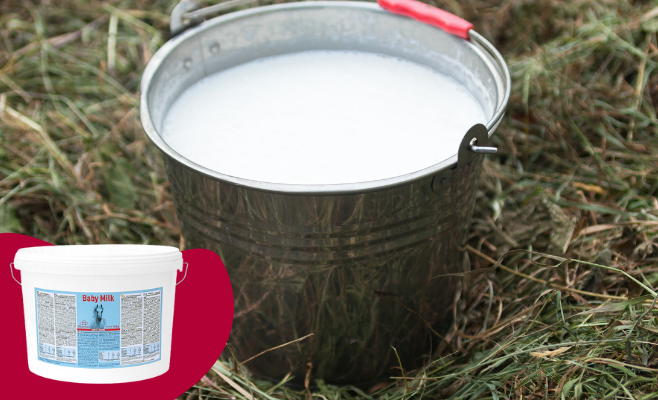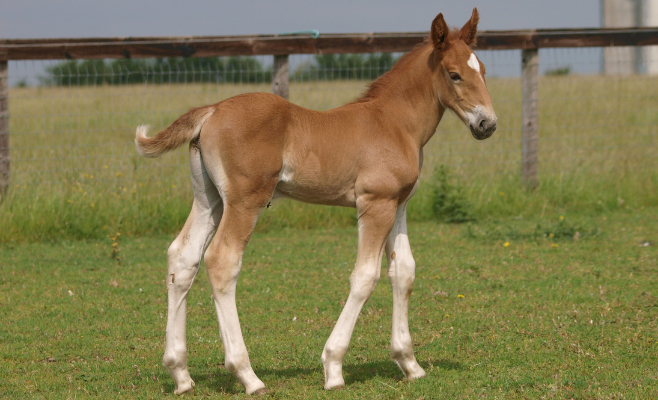The Orphan Foal: Management and Feeding

Gastric ulcer in horses
25 January 2022
Horse hoof care: 5 tips from Equiplanet
23 May 2022The Orphan Foal: Management and Feeding

Every breeder knows that he or she may have to manage an orphan foal because of birth complications or subsequent injuries or diseases unrelated to birth that may affect the mare. You may also be faced with a foal that has been rejected by its mother or that produces little milk. Equiplanet offers you some useful advice for dealing with adverse events that can occur during this period of the breeding season.

How common is it in breeding to have an orphan foal?

It is more frequent to have complications in the foaling of primiparae and the frequency is 2% overall. You need to be prepared, especially if you have never handled such a situation before.
The first hours of life of the orphan foal:

The first hours of life are crucial for the orphan foal’s intake of colostrum. Colostrum is necessary for the passive transfer of antibodies to the foal and must be taken within the first 12 hours of life. A foal absorbs 85% of colostral antibodies in 6-8 hours. By 24 hours there is no longer any permeability of the intestinal mucosa to immunoglobulins and any attempt at administration will be worthless.
How to get colostrum?

- From a mare that has foaled 6-12 hours ago – she can give 250 ml after suckling her
- Frozen previously (duration of colostrum in the freezer: 2 years, thaw in warm water)
- Colostrum bank
- Ask at nearby stables
- Complementary feed replacement for colostrum
The alternative to colostrum is equine plasma
The first week of life of the orphan foal
The simplest thing is to find a wet nurse for the foal. It may take up to 24 hours for the orphan foal and mare to become familiar with each other, but often mares whose foal has died are well prepared and when the foal begins to latch on to the udder, all resistance disappears. If there is no possibility of having a wet nurse, complementary feeds as milk replacer.

Orphan foals require a great deal of effort because they must be checked every 2 hours or more frequently. In the first 8 hours, it will have to feed 3-4 times. From then on it will feed every 1-2 hours for the first 3-4 days of life with a complementary powdered feed that must be reconstituted and administered through a bottle. The more frequently it is fed, the more optimal its growth rate will be.
Choosing milk replacer for orphan foals
The choice of milk should be well thought out, a good complementary feed for lactation will not cause constipation or soft stools or gas colic in orphan foals. To be a good milk replacer it must smell of milk, be palatable and contain at least 20% crude protein and 15% crude fats. Baby Milk complementary feed for lactating orphan foals contains 21% protein and 18% fat, ensuring the intake recommended by equine nutrition experts. Baby Milk also provides Vitamins and Minerals to meet the needs of foals in the early stages of their life.
| Broodmare’s Milk | Baby Milk | |
| Crude protein | 17-23 | 21 |
| Crude Fiber | 0 | 0,3 |
| Lactose | 59,66 | – |
| Crude Fats | 11-15 | 18 |
| Crude Ash | 3-7 | 7 |
| Sodium | 0,2-0,5 | 0,5 |
How much reconstituted milk should an orphan foal take?

At one day of age, its intake should be 10% of its body weight; this percentage should be gradually increased to 25% of its body weight at 10 days of age until weaning, in practice a foal of about 50 kg drinks 12 litres or more of milk per day. The important thing is not to give too concentrated amounts and always dilute 1:9, one part powder to 9 parts warm water. Dejections that are more liquid than normal are considered physiological, especially in the first 14 days of life.

Feeding large amounts of milk in a single meal, especially to very young foals, overtaxes the digestive system to process and absorb the sugars and proteins in the milk and will lead to the soft stools and clogged foal appearance often seen in foals fed complementary lactation feeds.
Switching from bottle to bucket
It is generally preferable to switch from bottle-feeding the orphan foal to bucket-feeding during the second week. This is certainly more practical, but it is also important from an ethological point of view so as not to humanise and spoil the foal. The foal must never associate feeding with man. As it grows up, its lack of socialisation with other horses could make it dangerous. It is important to put it in contact with other horses from which it can learn the right ethological lessons.

The change to the bucket may take a few hours and a little patience, but the orphan foal usually adapts well to this change. In any case, whether bottle or bucket, the important thing is to wash and rinse nipples and containers thoroughly after each use, as residues can be an excellent substrate for the growth of microorganisms that are harmful to the foal.
Orphan foal: Probiotics yes or probiotics no
The few clinical studies conducted to date on foals and complementary feeds containing probiotics show unsatisfactory evidence of efficacy and their use potentially contributes to aggravating rather than mitigating the watery consistency of faeces.
Will the orphan foal always lag behind its peers?
There is a misconception that the orphan foal will never reach its genetic potential and will never reach standard height. In reality, if orphan foals are constantly monitored and fed the correct milk replacer, they can become as strong and high-performing as those bred with maternal care. Growth rates are similar to those of foals raised with their mothers

In the first two months it is often slower, but orphaned foals recover by the time they are weaned. According to one study, foals fed replacement diets gained 12% to 28% less weight in the first two weeks than foals suckled by their dam. However, at four months of age, the weights of powder-fed foals were similar to those of dam-fed foals.
Foal growth chart under mother vs orphan foal
Daily weight gain of foal Kg/day of foal under mother and orphan fed with milk powder:
| Foal | 0-2 weeks | 2-8 weeks | 8-16 weeks | 16-24 weeks | 0-24 weeks |
| Feeding by broadmare | 1,50 | 1,42 | 0,80 | 1,13 | 1,12 |
| Feeding with milk replacer | 0,43 | 1,57 | 0,82 | 1,43 | 1,18 |
When can weaning of the orphan foal begin?

As early as a few weeks after birth, the foal will show an interest in solid feed and it is at this time that you must begin to make water available to it. The foal’s gastro-intestinal system is not developed to take solid food until the foal is at least a couple of months old. It is important to offer it hay and complementary feed pellets for foals as Mac Breed

However, it is important to avoid giving the orphan foal large quantities of feed twice a day as is done in the adult, as this could damage the still incompletely formed digestive system and result in soft stools. The optimum weaning time will be around 4 months of age for the orphan foal or generally when it is consuming 2-2.5 kg of solid feed or complementary lactation feed.
Suggestions:
- If you bottle-feed the foal, take care to hold the foal’s nose below eye level so that it can swallow easily and reduce the risk of it aspirating milk into its lungs. If he is reluctant, do not force him, for the same reason.
- If changing from one brand of milk replacer to another, this should be done gradually to avoid gastrointestinal disturbances, as is done when changing feed in adults.
- The microbial flora does not fully develop until 6-10 months, the age at which natural weaning takes place. Therefore, when weaning early, the use of pelleted feed that is easily chewed and digested is recommended.
- Minimise human interaction with the foal until it has bonded properly with an adult horse, in this way we avoid aggressive and abnormal behaviour that can occur in adulthood
- Orphan foals between birth and two months of age consume an average of 12.5 L of reconstituted milk per day, always check consumption to see if you are feeding your foal correctly.
- – Increase the frequency and reduce the volume of meals and the more difficult it will be to have episodes of soft stools

For foals raised on a milk replacer, it is essential to carefully monitor the amount and timing of feedings and pay close attention to providing a balanced diet when the foal is weaned from the milk replacer. For more information contact us and email info@equiplanet.it
Bibliography
- Raising the orphan foal. J M Naylor, R Bell. 1985
- Importance of milk replacer intake and composition in rearing orphan foals. N F Cymbaluk, 1993
- Clinical parameters, intestinal function, and IGF1 concentrations in colostrum-deprived and colostrum-fed newborn pony foals. F Palm, 2013
- Nutrizione Equina, Joe Davies, 2018
- https://ker.com/equinews/raising-orphan-foal/
- Equine Behavioral medicine, BV Beaver 2019

